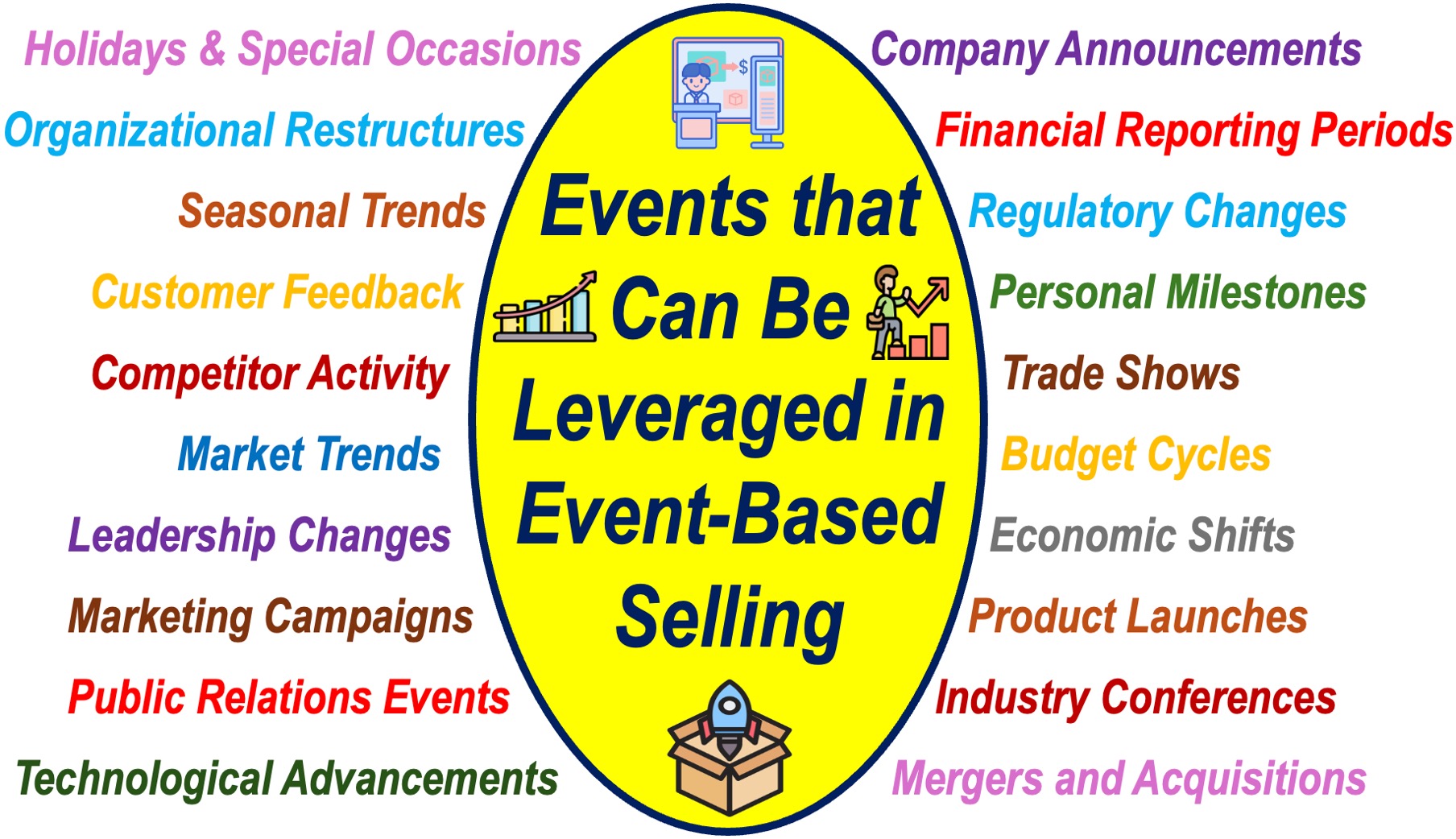Does your sales approach revolve around recognizing and capitalizing on specific events or triggers that can influence your customers’ buying decisions?
These events could be anything from a product launch, a significant change in the market, or even personal milestones for your customers.
If so, you are an Event-Based Seller – you practice Event-Based Selling, Event-Based Sales, or Event-Based Marketing.
By understanding and reacting to these events, you can position your products or services as the ideal solution at the right time.
Customerly.io has the following definition of Event-Based Marketing:
“Event-Based Marketing (EBM) is a form of marketing that identifies significant events in a customer’s life or behavioral patterns and uses them to create targeted and relevant marketing campaigns.”
“These events can range from personal milestones to interactions with a product or service. EBM is a strategy aimed at influencing a customer’s need at a precise moment, thus increasing the likelihood of a purchase.”
A Customer-Centric Sales Strategy
Event-Based Selling is a type of customer-centric sales approach. While the practice of timing sales around significant events has been around for decades, the formal recognition of Event-Based Selling as a distinct strategy gained traction in the late 20th century.
It started to become more popular in the late 1990s and early 2000s, driven by advancements in technology and data analytics.
These innovations made it easier to identify and respond to critical events in real time. Today, event-based selling is a powerful and popular strategy in the world of B2B (business-to-business) sales.
Event-Based Selling – Timing Matters
At the core of Event-Based Selling is the idea that timing is crucial in sales. When you align your sales efforts with key events in your customers’ lives or in the industry, you increase the chances of meeting their needs when they are most receptive.
This approach requires you to be vigilant and proactive, constantly monitoring for events that could serve as opportunities to engage with your customers.

New Product Launch
One common example of Event-Based Selling is when a company launches a new product.
If your business can offer complementary products or services, this is the perfect time to reach out to potential customers.
You could highlight how your offerings enhance the new product or help customers get the most out of it.
By doing so, you demonstrate that you understand their current needs and are ready to provide immediate value.
-
New Smartphone Launch
For example, if a tech company launches a new smartphone, your business could offer complementary accessories such as cases, chargers, or screen protectors. You can highlight how your products enhance the new device’s functionality and protection, providing immediate value to early adopters.
Regulatory Changes
Another example might involve changes in regulations or industry standards. If these changes affect your customers, they may need new solutions to comply.
By anticipating these needs and offering your services at the right moment, you position yourself as a trusted partner who is attuned to their challenges and ready to help them navigate the new landscape.
-
New Data Protection Regulations
For example, if the government introduces new data protection regulations, your business could offer updated cybersecurity services or compliance software to help companies meet the new requirements.
Personal Milestones
Personal milestones can also be powerful triggers for Event-Based Selling. For instance, if you know that a key decision-maker at one of your target companies has recently been promoted, it might be an opportune time to reach out.
Their new role could come with new responsibilities, and they may be more open to considering fresh solutions that can help them succeed.
-
New Leadership Role
For example, following somebody’s promotion to a leadership role, you could offer them upper management software or consulting services tailored to help them excel in their new position.
Event-Based Selling – Being Well Informed
To successfully implement Event-Based Selling, you must find out as much as you can about your customers, their industry, their *pain points, and their priorities. Use data and analytics to track relevant events and identify patterns that could signal a sales opportunity.
* Pain points are specific problems or challenges that a customer is experiencing and seeking to resolve.
Social media, news sources, company press releases, financial statements, industry blogs, and customer feedback surveys are valuable tools for staying updated on potential triggers.
Final Thoughts
Event-Based Selling is about being in the right place at the right time.
By aligning your sales efforts with events that matter to your customers, you can create more meaningful connections and increase the likelihood of closing deals.
It is about understanding that your customers’ needs evolve over time, and by staying attuned to these changes, you can offer solutions that are both timely and relevant.
Good luck in your sales endeavors
